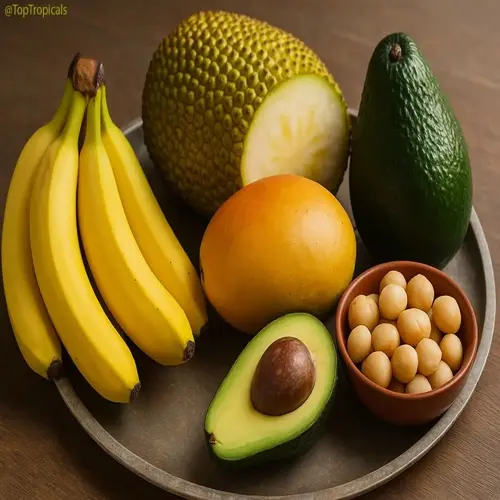Nutrition for Mental Health: Essential Guide

Written by
Chen Jialiang
Reviewed by
Prof. Graham Pierce, Ph.D.Nutrition for mental health decreases inflammation and improves neurotransmitter function.
Hydration helps maintain cognitive clarity, with just a 2% level of dehydration leading to a significant impairment in focus.
Cooking methods, such as steaming, preserve 90% of significant brain-protecting nutrients.
The gut microbiome provides 90% of serotonin, which is an important part of controlling mood.
Essential nutrients like Omega-3s provide the building blocks for the brain cell membrane and reduce depression.
Eating along the lines of a Mediterranean diet lowers anxiety by emphasizing fruits and vegetables, antioxidants and healthy fats.
Article Navigation
Understanding nutrition for mental health begins with the plate. What you eat affects the chemistry in the brain. The intestines produce ninety percent of serotonin in the body. This mood regulator will depend on the foods you choose daily. I've seen clients with transformed anxiety from changes in their meals.
Food affects your mind in three important ways: First, it changes your brain chemistry. Secondly, it stabilizes your mood. Finally, it builds mental resilience. This article explains the underlying science of these connections. We give you useful ways to eat for a healthier mind. You can get started today.
Hydration and Cognition
A mere 2% dehydration results in a 10% drop in concentration, and stress hormones increase. That's like losing a full cup (240ml) of water from your body. The brain will shrink (temporarily) without enough fluid, impairing the ability to make decisions and control emotions. I know my own concentration suffers when I don't have my morning water.
Seek to drink eight 8-oz glasses of water daily. This is approximately 2 liters or half a gallon. Carry a reusable water bottle to measure your beverages. Herbal teas, such as chamomile, offer two distinct benefits. They hydrate, while simultaneously activating the GABA receptors, which naturally suppress nervous activity. So if your concern is the result of nervousness or anxiety, anxiety can be abated and alleviated much like the effects of medication.
Caffeine isn't all bad. One cup of coffee (8oz/240 mL) can stimulate alertness if taken at the right time. Excessive caffeine consumption acts as a diuretic. It dehydrates your body and increases feelings of anxiety. It should be used intelligently, not throughout the day, but only when necessary. It must be balanced with the same amount of water intake.
Cooking for Nutrient Retention
The way you prepare food changes its brain benefits. Cooking vegetables at temperatures below 100 degrees Celsius (212 degrees Fahrenheit), such as steam cooking, retains 90 percent of the sulforaphane found in broccoli. This substance fights brain inflammation. However, boiling destroys water-soluble vitamins, such as the B vitamins and vitamin C (ascorbic acid). Daily, I steam vegetables to protect these vital nutrients that are required for clarity of thought.
Various vitamins need special heat treatment. Vitamin C is destroyed at temperatures above 70°C (158°F). Lycopene in tomatoes requires a medium heat of 150-175°C (302-350°F) to be absorbed by the body. Always cook tomatoes in olive oil to great advantage. This involves the liberation of the green earth and is achieved through the necessary pre-treatment, which includes anti-oxidation, thereby protecting brain cells.
Fresh spinach supplies more vitamin C. When tomatoes are cooked, lycopene is more readily absorbed. Blanch the green beans in boiling water for 60 seconds, then transfer them to ice water. This destroys the enzymes that deplete the B vitamins. You get crisp vegetables with B-vitamins intact.
Steaming Vegetables
- Science: Gentle heat below 212°F (100°C) preserves water-soluble vitamins like B-complex and C
- Optimal practice: Cook broccoli for 5-7 minutes until bright green to retain 90% of sulforaphane
- Mental benefit: Sulforaphane crosses blood-brain barrier to reduce neuroinflammation
Sautéing with Olive Oil
- Science: Medium heat (300-350°F/149-177°C) enhances lycopene absorption in tomatoes by 200%
- Optimal practice: Cook tomatoes 10 minutes with 1 tbsp (15ml) extra virgin olive oil
- Mental benefit: Lycopene protects neurons against oxidative stress
Raw Consumption
- Science: Preserves heat-sensitive enzymes and vitamin C in foods like bell peppers and spinach
- Optimal practice: Combine with healthy fats (avocado) to boost fat-soluble vitamin absorption
- Mental benefit: Vitamin C aids neurotransmitter synthesis including serotonin and norepinephrine
Blanching Techniques
- Science: Quick boiling (30-60 seconds) followed by ice bath deactivates nutrient-destroying enzymes
- Optimal practice: Use for green beans to preserve chlorophyll and B-vitamins intact
- Mental benefit: B-vitamins support mitochondrial energy production in brain cells
Low-Temperature Baking
- Science: Cooking below 300°F (149°C) prevents formation of advanced glycation end-products
- Optimal practice: Bake sweet potatoes for 60 minutes at 275°F (135°C)
- Mental benefit: Maintains antioxidant capacity to combat neural oxidative damage
Gut-Brain Connection Explained
Your gut is the body's second brain, constantly communicating with the central nervous system. It's a two-way street, an oversized highway of hormone and nerve signals. When the gut is upset, mood often follows suit. I've seen this personally with clients who complain of digestive disorders from anxiety.
Specialized cells in your gut lining create neurotransmitters, including serotonin. In fact, approximately 90% of the body's serotonin supply is produced there. These chemical messengers travel through the bloodstream and via the nerves, where they act directly on the emotions and stress response of the nervous system.
The vagus nerve serves as the primary communication cord, bringing updates from your gut to the brain in milliseconds, which is why stress produces physiological sensations like butterflies in the stomach. By soothing the vagus nerve through deep breathing, digestion, and mental clarity can be attained almost immediately.
Diverse gut bacteria enhance mental fortitude. They produce chemicals, such as butyrate, that protect your brain. The greater the diversity of your microbiome, the better you can handle stress. Eaten daily, fermented foods will increase this microbial diversity naturally. It's my top recommendation for clients who are facing burnout.
Vagus Nerve Signaling
- Science: Primary communication highway transmitting gut status to brain in milliseconds
- Evidence: 80% of vagus fibers carry information from gut to brain
- Impact: Stimulation reduces stress hormones and improves mood regulation
Neurotransmitter Production
- Science: Gut microbes produce 90% of body's serotonin and 50% of dopamine
- Evidence: Specific strains like Bifidobacterium longum increase GABA production
- Impact: Directly influences anxiety levels and emotional balance
Short-Chain Fatty Acids
- Science: Fiber fermentation creates butyrate that strengthens blood-brain barrier
- Evidence: Butyrate reduces neuroinflammation by inhibiting NF-kB pathway
- Impact: Protects against brain fog and cognitive decline
Immune System Mediation
- Science: Gut microbiota train immune cells to regulate brain inflammation
- Evidence: Healthy microbiome reduces pro-inflammatory cytokines by 40%
- Impact: Lowers risk of depression linked to chronic inflammation
HPA Axis Modulation
- Science: Microbes influence hypothalamic-pituitary-adrenal stress response
- Evidence: Lactobacillus rhamnosus lowers cortisol levels by 25%
- Impact: Improves resilience to psychological stressors
Essential Brain Nutrients
Omega-3 fatty acids are the number one nutrient for brain impact! They help build the membranes of neurons and also help reduce the risk of depression. They can be obtained from fish sources, such as salmon (85 grams), and from plant sources, such as chia seeds (28 grams). These fats help enhance BDNF production (brain-derived neurotrophic factor), leading to the generation of new brain cells. I encourage daily intake of these fats for clients who suffer from mood disorders.
B vitamins regulate the synthesis of dopamine and serotonin. A deficiency of folate is directly linked to depression. Two eggs per day or 1 cup of spinach (30 g dry) should be included. Plant substitutes include lentils (100 g cooked, an easy substitute). These vitamins turn food into mental energy. Without them, your neurotransmitter factories will cease to function.
Vitamin D regulates genes involved in mood regulation. It's found in 15 minutes of sunlight exposure and 70g of mushrooms. Up to 40% of the public is deficient. This vitamin activates tryptophan conversion to serotonin. I take vitamin D3 in the winter months to maintain emotional balance.
Mediterranean Diet Simplified
Rather than calorie counting, the Mediterranean diet is built on whole foods. For their antioxidants that help fight brain inflammation, aim for five servings of vegetables daily (approximately 600g). Compare this to Western diets heavy in processed snacks, which raise blood sugar levels and cloud your thinking.
Consume healthy fats by using 4 to 6 tablespoons (60-90ml) of olive oil per day. This monounsaturated fat increases neural signaling, whereas the fried foods commonly used in the Western diet contain inflammatory oils. Use nuts like almonds (28g handful) for vitamin E, which protects the brain cells.
Aim for two to three portions of lean protein (170 to 255 g). Prefer to eat fish rather than red meat to promote increased intake of omega-3 fats. While red meat meals promote neural inflammation, those containing protein do not. Legumes, such as lentils (100g cooked), promote sustained energy throughout the day without dips in mood.
Berries (1 cup/150g) deliver flavonoids that help memory. Skip sugary desserts that are often included in most Western meals. Use herbs like rosemary in your cooking, as the Mediterranean people do. They contain compounds that naturally lower stress hormones. I add rosemary and other herbs to meals for my clients with anxiety.
5 Common Myths
Sugar creates a temporary spike in mood and mental energy
Although sugar forces an immediate release of dopamine in the brain for short-term pleasure, it causes a crash in blood sugar that increases fatigue and anxiety. Research indicates that high sugar intake puts one at 30% greater risk for depression caused by inflammation, in addition to neurotransmitter production dislocations. Complex carbohydrates are a better source of prolonged mental energy.
All dietary fats are harmful to the brain and mental functioning
This misconception overlooks that omega-3 fatty acids, which are necessary for brain-cell formation and reduce depressive states by 20%, monounsaturated fats (olive oil) operate to facilitate the function of neurotransmitters, trans fats (from highways) are associated with increased neuroinflammation, and more. Thus, the distinction between bad and good fats is scientifically established.
Nutritional supplements can fully replace whole food sources for mental health
$These supplements do not consist of the correct combinations of nutrients that are obtained from whole foods to maximize brain functioning. For example, spinach gives magnesium along with co-factors that enhance absorption of the magnesium. If one uses isolated supplements, they miss these relations between other factors. The same is true of whole foods in the case of other beneficial substances of a nature not found in the ordinary supplement, for instance, the polyphenols.
Eating properly for mental health entails cutting out every food that can be enjoyed and eliminating all pleasurable tastes.
The Mediterranean-style diet rich in herbs and spices and fats gives a variety of tastes while at the same time increasing mental well-being. The flavors from spices like cinnamon and turmeric and from foods like dark chocolate yield satisfying flavors plus neuroprotective advantages that exemplify that mental nutrition is based on nutrient density rather than deprivation.
Hydration status has little effect on brain functioning and emotional stability
Even 2% dehydration reduces focus by 10% and increases the production of cortisol, which directly impairs brain performance. Proper hydration leads to proper balance of neuro-transmitters and nutrient transport to the brain, while chronic dehydration has been found to correlate with 15% increase in anxiety rates accrued by hydration studies.
Conclusion
The transformative power of the meals you eat daily cannot be overstated when it comes to your mental wellness. Each food you choose either builds resilience in the brain or takes it away. I have seen my clients reach freedom from depression through simple changes in nutritional habits. Start with one swap today, such as salmon instead of processed meats. This will cause real change.
Focus on sustainable habits, not perfection. Add two servings of vegetables before cutting anything out. Use herbs instead of salt for flavor. These small wins accumulate as your taste buds and brain chemistry adjust over time. Progress, instead of perfection, leads to lasting mental health benefits.
Relate every mouthful to your mental state. A handful of walnuts can improve your focus. The spinach in your lunch enhances your ability to cope with stress. You have the power to control this connection through daily decisions. My top clients keep track of how food affects their moods and tweak accordingly.
External Sources
Frequently Asked Questions
What diet best supports mental health?
The Mediterranean diet is scientifically proven to enhance mental wellness through its emphasis on whole foods like vegetables, fruits, healthy fats, and lean proteins. These components reduce inflammation, support neurotransmitter production, and improve cognitive function.
Can hydration affect mental clarity?
Even mild dehydration significantly impacts cognitive function and emotional stability. Maintaining proper fluid intake supports neurotransmitter balance and nutrient delivery to the brain. Optimal hydration prevents brain fog, reduces cortisol spikes, and enhances focus.
How does gut health influence mood?
The gut microbiome directly regulates mood through neurotransmitter production and inflammation control. Key connections include:
- Gut bacteria produce 90% of the body's serotonin
- Short-chain fatty acids strengthen the blood-brain barrier
- Vagus nerve signaling communicates stress responses
- Microbiome diversity lowers depression risk
Which nutrients are essential for brain health?
Critical nutrients for cognitive function include:
- Omega-3s for brain cell membrane structure
- B vitamins for neurotransmitter synthesis
- Vitamin D for mood gene regulation
- Magnesium for neural calmness
- Zinc for stress response modulation
Do cooking methods affect nutrient benefits?
Yes, cooking techniques directly impact nutrient bioavailability. Gentle methods like steaming preserve up to 90% of brain-protecting compounds in vegetables. High-heat cooking destroys heat-sensitive nutrients like vitamin C and B vitamins.
Can sugar consumption worsen anxiety?
High sugar intake triggers inflammation and neurotransmitter imbalances that increase anxiety risk. It causes blood sugar crashes that elevate cortisol by up to 30%, directly impacting emotional stability and cognitive performance.
How do healthy fats improve mental function?
Monounsaturated and omega-3 fats enhance neural signaling and reduce brain inflammation. They support neurotransmitter production, improve neuron membrane fluidity, and protect against cognitive decline. Olive oil and fatty fish are particularly beneficial.
Are probiotics effective for mental wellness?
Specific probiotic strains like Bifidobacterium and Lactobacillus improve mental health by:
- Reducing cortisol production
- Increasing GABA for anxiety relief
- Strengthening gut-brain communication
- Lowering inflammatory markers
Can nutrient deficiencies cause depression?
Chronic deficiencies in key nutrients are strongly linked to depression. Inadequate omega-3s, B vitamins, vitamin D, or zinc disrupts neurotransmitter synthesis, increases neural inflammation, and impairs stress response systems.
What foods support serotonin production?
Foods that boost serotonin include:
- Turkey and eggs (tryptophan sources)
- Spinach and lentils (folate-rich)
- Salmon and walnuts (omega-3s)
- Pumpkin seeds (zinc-rich)
- Fermented foods (probiotics)

